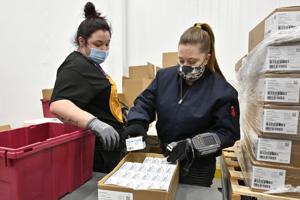Op-Ed: With proper patent protection, vaccines offer plenty of promise

Since the start of the pandemic, leading drug makers such as Pfizer, Moderna, AstraZeneca, and Johnson & Johnson have relied on robust intellectual property (IP) protections in developing coronavirus vaccines. Because of the patent protections afforded by developed countries such as the U.S. and U.K., leading manufacturers have felt comfortable putting billions of dollars on the line and weathering a difficult, unpredictable Food and Drug Administration approval process.
But now, the White House is contemplating doing away with IP protections altogether for COVID-19 treatments and vaccines. According to CNBC reporters Kayla Tausche and Jacob Pramuk, “A temporary suspension of intellectual property protections would apply to all medical technologies to treat or prevent Covid-19.” This disastrous policy would wreak havoc on the pandemic eradication effort, forcing companies to cut back on lifesaving research at the worst possible time. The Biden administration should reject this misguided approach and affirm the importance of patent protections.
It’s always tempting for politicians and pundits to point the finger at “greedy companies” who refuse to share the intellectual property of their prized products. But right from the get-go, drug manufacturers have been more than happy to share their homework with the outside world. For example, Moderna has openly offered their COVID-19 related patents to the world for the duration of the pandemic and is also willing “upon request … to license … intellectual property for COVID-19 vaccines to others for the post pandemic period.” But there’s a world of difference between this tailored, voluntary approach and an open-ended IP suspension by government fiat.
Sure, the Biden administration and other governments can insist all they want that such a suspension would be grounded on transparent guidelines and of a limited duration. But spurred by a permissive World Trade Organization framework, plenty of countries – including Ecuador, India, Indonesia, Malaysia, Thailand and Brazil – have opted to ignore IP rights for medications with little recourse for the manufacturers of these products.
Understandably, vaccine producers are fearful that IP protections are hard to win back (via costly legal battles) once lost. Companies would predictably respond to more compulsory licensing by limiting their reliance on these patents, which would be a shame given the potential posed by newly created and future vaccines. The technology currently being deployed to fight COVID-19 may be able to fight various cancers down the road, with a new generation of mRNA vaccines fending off aggressive tumors. But innovators won’t put in the necessary investments if governments around the world can seize their IP with impunity.
It is simply far more difficult for societies to innovate without the promise of IP protection. Researchers from Iowa State University, Washington University and the Swedish House of Finance found that, of various government measures to foster innovation, only patent protection and basic financial market rules seem to do the trick. These measures are found to be superior to “traditional tax subsides at promoting the innovative investments that drive economic growth.”
Additionally, prominent British biochemist Terence Kealey notes that there is little correlation between levels of public R&D investment and economic growth. Despite all the criticism of IP enforcement, propertarian rules cannot be effectively replaced by government intervention.
From vaccine manufacturing to semiconductor production to movie/television production (including Baby Yoda), weakening IP protections harms the entire economy. Compulsory licensing would inflict a double whammy on the U.S. market by harming anti-pandemic research and making it more difficult for other sectors to grow and innovate. The Biden administration must embrace patent protection and commit to pro-growth policies to get America past this difficult time.
Disclaimer: This content is distributed by The Center Square

